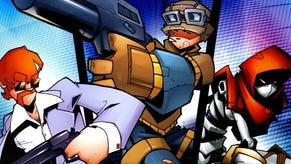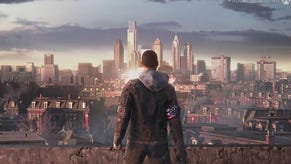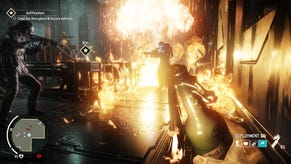The Weekly Wrap: March 13-19 - Homefront, Jaffe, more
The news never sleeps. You do. We know. We're watching. Here's some help staying abreast of the week's events, human weakling.
Fighting the Homefront – THQ’s biggest gamble to date
What happened: So many things. THQ bet the farm on Homefront, only to receive early reviews that were, well, mixed. Stocks dropped. Investors panicked. Somewhere, Danny Bilson turned, looked at a camera, and squeezed out a single meandering tear. But all hope wasn't lost. Day-one sales clocked in at a solid 375,000 in North America alone.
What it means: So many things. For one, we could be seeing the beginning of a real rift between critical “hardcore” gamer opinion and the general purchasing populace. We can hoot and holler about Call of Duty clones until we drop from exhaustion and have to be carted off in a waaahmbulance, but so long as they keep selling, EA, THQ, and the like will keep on pumping them out. As for Homefront and all its not-quite-Half-Life-ness, the prognosis isn't half-bad. Homefront 2's in the planning stages, and Kaos at least seems fairly aware of the first game's missteps. Despite the heavy handedness and derivative design, there's potential buried in Homefront's vision of a crumbling America. Here's hoping Kaos uses its second chance better than its first.
Emotional Molyneux lauds BAFTA in Fellowship speech
What happened: The British Academy held its big videogame bash, and the usual suspects – Mass Effect 2, Civilization V, Heavy Rain, etc – cleaned up. “But wait,” you declare while searching for your favorite game. “Where's my favorite game? That I'm searching for? I declare.” If you're referring to Red Dead Redemption, Rockstar withdrew it. As for any others, well, have you tried playing good games lately?
What it means: Our industry got a chance to stand up on a big stage and conduct itself in a mainstream setting, and it passed with flying colors. Winners were grateful and passionate, and Peter Molyneux capped off the night by giving a near-tearful tribute to all corners of the industry – even touching on recent breakthroughs like Minecraft and Limbo. Regardless of your opinions on the man and his boy-who-cried-love-and-children-and-trees-but-instead-attacked-us-with-wolf-monsters approach to game development, you can't help but respect that.
Hines: Graphics do matter, you liars
What happened: Mind-blowing visuals may not revolutionize the we play games or anything like that, but Bethesda's Pete Hines argued that the hoity toity “graphics are for lower beings who still answer to the carnal urges of their eyes” approach is equally flawed.
What it means: Hines makes a good point. Regardless of how many times we've been told not to, most of us can't avoid judging books by their covers. However, games are also diversifying across a mind-boggling spread of platforms, and some of them simply aren't capable of rendering eyelash hairs you can see from space. Thus, top-of-the-line, bleeding-edge graphics aren't necessarily the only way to go anymore. Rather, it's about giving your game a look that's both eye-catching and fitting. So yes, graphics do matter – and they always will – but a gray, super hi-res world that cracks open gaming machines like eggs and slurps out their delicious innards will only get you so far. People only have time for so many games nowadays. The question, then, is whether or not your game looks like it's worth some of that precious time.
Jaffe: Call developers out on artistic pretension
What happened: “This,” you're probably thinking, “from the man who brought us God of Threesomes and Eyeball-Splattering and Also War, I Guess? Hah!” But Jaffe's never claimed to be some sort of artistic visionary, and he thinks other game creators haven't earned that distinction either.
What it means: It's not a crime to give yourself a pat on the back every once in a while, but we should at least pay closer to attention to why we're doing it. This bit, especially, puts things in perspective: “The very nature of something being artistic and important means that – except in rare cases – its power is evident without anyone having to tell you that it is.” Meanwhile, gamers climb to the highest mountaintops, whip out their soap boxes, and preach “games are art” sermons to the unwashed masses below. But why? Really, who are we trying to convince? And – at the end of the day – does it even matter whether people can affix a largely arbitrary to distinction to our medium? At any rate, complacency's a death sentence in any creative medium, so giving it a free pass in ours probably isn't the best idea.
Packaged NGP games will get day-one digital release
What happened: Tired of fiddling with objects, things, and stuff? Did you embrace the digital era years ago, only to find that you'd left most of the world in the dust? Well, Sony's got your back. With PSPgo going, going, gone, the console-maker's instead adopted a two-tiered strategy. Physical or digital, you need not worry about being left out in the cold on day one.
What it means: Sony seems to have finally struck a decent balance between the ever-growing digital market and the lingering vestiges of physical media. At this point, of course, people are still busy being wowed by the portable powerhouse's graphical capabilities and Noah's Ark-like ability to have two of things (touch screens, analog sticks, etc), but oftentimes, it's the little things that count, and Sony already seems to have a fairly clear vision of what it wants the NGP to be. The PSP and PSPgo definitely paved the way for this one, but will gamers be willing to roll out the red carpet? Who knows – given that they could have their hands could be full with 3DSes and iPhones. Pass the popcorn, though, because – one way or another – this is going to be good.












